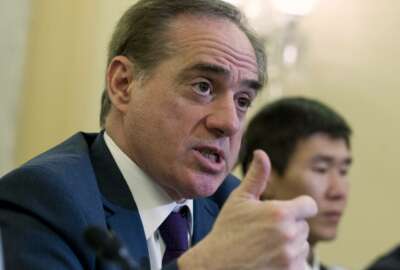

With deaths from coronavirus and the U.S. economy going in opposite directions, one up, the other down, Congress will try and finish up legislation this week to...
With deaths from coronavirus and the U.S. economy going in opposite directions, one up, the other down, Congress will try and finish up legislation this week to help out. For a look at what to expect, Federal Drive with Tom Temin was joined by WTOP capitol hill correspondent Mitchell Miller.
Interview transcript:
Tom Temin: Let’s begin with the 49 or so billion dollar appropriation for federal agencies themselves that the administration is seeking. What’s happening there?
Mitchel Miller: Well Tom, these federal agencies are looking for billions of dollars in additional funds to deal with the crisis. They have a wide variety of needs, but many agencies are seeking more money to ramp up their telework capabilities. Just one example is the Education Department. They’re seeking $10 million. And as you are very familiar with with this issue, telework has been a perennial problem with lawmakers on Capitol Hill. Many of them continuing to press a lot of these agencies to make sure that they get the capabilities that they need. Obviously, a lot of these agencies during this crisis have found out they don’t have enough telework. They don’t have enough laptops. They don’t have enough ability for all these people that now are working from home or elsewhere to all log in and get in and on the system. So again you have Virginia Congressman Gerry Connolly pressing these agencies to let people do more to work from home. And Virginia Congressman Don Beyer, who’s been in self quarantine, has also been pushing for agencies to maximize their tell our capabilities. And of course, the abrupt departure of the OPM director. That hasn’t helped, because there’s been, in the view of many lawmakers, some lack of leadership about what actually needs to be done at some of the agencies.
Tom Temin: And by the way, if a Congress member or a Senator are self quarantining, can they legally vote?
Mitchel Miller: They cannot, right now. There is no remote system for lawmakers. A lot of people thought that after 9/11 that there would be. There was a lot of discussion about that related to how lawmakers could do that off of the hill. But there was a lot of pushback at the time, too, and there has been over the years. Many lawmakers who argue against remote voting
say that if you do allow that one, there’s a lot of security issues about what could actually happen there and then to a lot of them are concerned that lawmakers just won’t come back to Washington. As we both know a lot of lawmakers, of course, want to get back to their districts. But there’s some concern that they wouldn’t actually get back here to the capitol, actually have during normal times, face to face negotiations, talks over key issues. So while there’s a lot of discussion right now, there is still no remote system. And, of course, to set up that system would require a lot. So it doesn’t look like that’s going to happen anytime soon.Tom Temin: Sure, it’s no fun. You can’t insult the other party if you’re not there in person. So that Bill, though I guess I misspoke. It’s 45.8 billion. Pretty much looks like it’s gonna happen, but just takes a little more time, right?
Mitchel Miller: It’s a supplemental from the White House, so this has got pretty much buy in from everybody, obviously, from the administration as well as the lawmakers. And now the lawmakers are really focused on this overall roughly trillion dollar, a massive economic aid bill, and I know that there’s a lot of areas of disagreement, and we can poke through a variety of different issues. But one area that I wanted to highlight that does have bipartisan buy in is the aid for small businesses. I was speaking with other reporters with Maryland Senators Ben Cardin and Chris Van Hollen about this issue, and Senator Cardin said businesses need money yesterday, so there’s a lot of efforts from both parties to quickly streamline things among them. They would like to turn current loans effectively into grants so that businesses can quickly cover their costs, keep their employees on the payroll. With so many businesses now shut down, of course, Republicans and Democrats agree this is a critical area for the recovery of the overall economy.
Tom Temin: And I guess a lot of this would get funneled through the Small Business Administration the way things were set up?
Mitchel Miller: Exactly. And some of these businesses already have these loans, and that was what Senator Cardin was saying, he says, rather than tacking onto these, why don’t we just make this a grant? And so then they don’t have to deal with all the additional paperwork. Now they do want to provide additional money, additional possibilities for these businesses to get the money they need. The problem is, of course, there’s a lot of regulatory issues and paperwork. They’re trying to cut through all of that because they know that these businesses, they can’t afford to be sitting here waiting for relief. Maybe 2, 3,4, 6 months down the line. They need to make these bills now.
Tom Temin: And then there is other legislation pending with respect to continuity of operations plans by federal agencies that would get a little bit more of sunlight.
Mitchel Miller: Right. Senator Mark Warner of Virginia and other lawmakers are really pushing for this. They sent a letter to OPM pressing the agency to make contingency plans public. They’re arguing that they need to reduce what they say is widespread confusion among federal workers and the public over what the plans are. Obviously, a lot of agencies, of course, are juggling a lot of issues related to this. But what these lawmakers say is that they haven’t really been made clear in a lot of cases, and in some cases this can be a simple as posting things on websites or getting it out to the public so that they know. One example that they pointed out that was a problem was the Social Security Administration last week. It was closing all of its local field and hearing offices, but the public didn’t know about it. So people showed up the next day at all these locked buildings across the country. So just one example of why they need they feel they need to get the sunlight on this issue.
Tom Temin: And what about the issue of testing sites that’s also coming up in Congress, I understand?
Mitchel Miller: That’s right. It started with the Virginia governor, as well as Virginia and Maryland governors, as well as the D.C. Mayor and then all of the lawmakers. Virtually every lawmaker from the D.C. area, all from Virginia, Maryland, and D. C. Delegate Eleanor Holmes Norton. They have written the president urging that the region be given priority to the locations of federally supported COVID-19 testing sites. They point out, of course, to the huge presence of federal workers here in the region, including key agencies such as Homeland Security, Health and Human Services in the Pentagon, and we could go on. But they point out that a lot of federal workers have to continue to work during this crisis, and it’s critical to the function of the federal government to make sure people get tested. Obviously, that has not been happening as much as people would like. And of course, as these numbers go up, we know that federal agencies need to have an idea of who has actually been tested, who has not been tested and what kind of impact that could have on the work continuity of those agencies.
Tom Temin: My vote would be for a giant circus tent right at L’Enfant Plaza where the money thousands passed through every year.
Mitchel Miller: I mean, there you go. I mean, there has been talk about things like that. There have been several conference calls that have been on where they talked about that, especially in the initial stages. Like they don’t want people just necessarily to go into hospitals. And they said, really, there’s no barrier to having these outdoor testing sites. And you’re seeing a lot of these creative ways that various health agencies and health workers are putting together these testing sites across the country. And actually that could be something, you know, as farfetched, as it might seem, that could be something that could actually be done.
Tom Temin: Let me ask you this. It seems like a thousand years years ago that they were bitterly divided on Capitol Hill over impeachment. And, of course, you were up burning midnight oil covering that for many, many weeks. And here we are in the coronavirus crisis. It seems like at least when it comes to spending a trillion or so, there’s a lot of bipartisanship that we thought was dead and buried
Mitchel Miller: Right. And unfortunately, as you and I both know, it’s often a crisis that will bring the lawmakers together. And that’s exactly what’s happening here. It’s incredible how things can move so slowly, so glacial speed throughout the year on a variety of micro issues. But then, when they really have to pull together, they can get this money together. You know, in a lot of people, many of the lawmakers have been asked, well, what about this trillion dollars? I mean how can you do this? But you know, Republicans, Democrats, people even that our deficit hawks, they’re saying that this is really just the time that everybody has to pull together and they will get this across the finish line eventually. It’s just a matter. It’s so complicated. There are so many parts of this legislation, but Democrats and Republicans, it looks like, are going to get together. They know they have to get together and they have to get this to the president’s desk.
Tom Temin: Mitchell Miller is Capitol Hill correspondent for W.TOP. As always, thanks so much.
Mitchel Miller: You bet.
Copyright © 2025 Federal News Network. All rights reserved. This website is not intended for users located within the European Economic Area.


